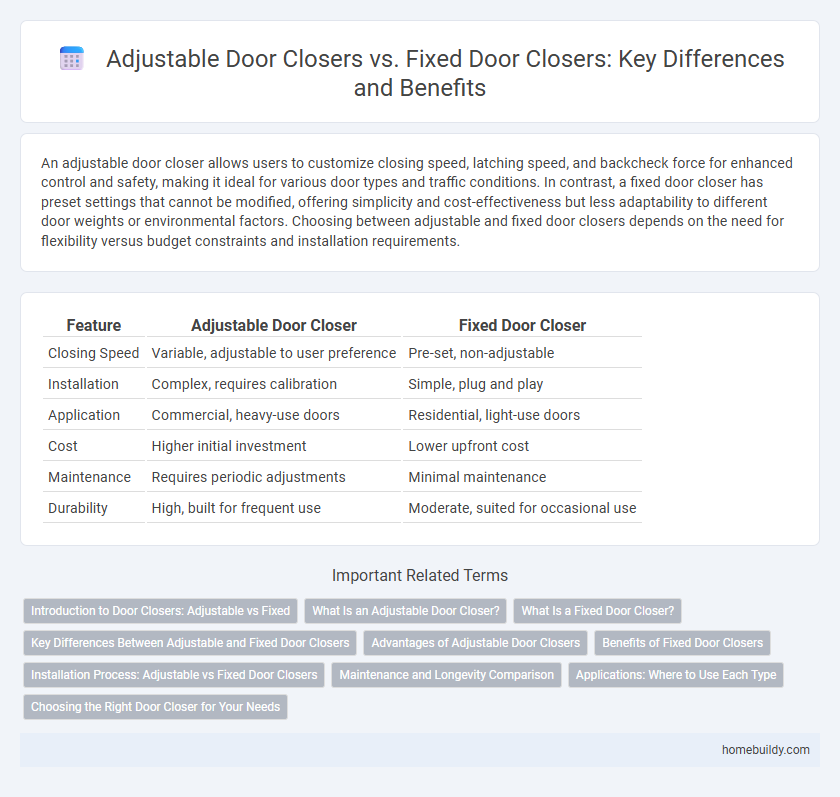An adjustable door closer allows users to customize closing speed, latching speed, and backcheck force for enhanced control and safety, making it ideal for various door types and traffic conditions. In contrast, a fixed door closer has preset settings that cannot be modified, offering simplicity and cost-effectiveness but less adaptability to different door weights or environmental factors. Choosing between adjustable and fixed door closers depends on the need for flexibility versus budget constraints and installation requirements.
Table of Comparison
| Feature | Adjustable Door Closer | Fixed Door Closer |
|---|---|---|
| Closing Speed | Variable, adjustable to user preference | Pre-set, non-adjustable |
| Installation | Complex, requires calibration | Simple, plug and play |
| Application | Commercial, heavy-use doors | Residential, light-use doors |
| Cost | Higher initial investment | Lower upfront cost |
| Maintenance | Requires periodic adjustments | Minimal maintenance |
| Durability | High, built for frequent use | Moderate, suited for occasional use |
Introduction to Door Closers: Adjustable vs Fixed
Adjustable door closers offer customizable closing speed, force, and latching options to suit various door sizes and user requirements, enhancing accessibility and security. Fixed door closers provide a set, non-adjustable closing force ideal for standard applications where consistent performance is necessary. Choosing between adjustable and fixed door closers depends on factors such as door weight, traffic frequency, and specific installation environments.
What Is an Adjustable Door Closer?
An adjustable door closer allows precise control over the door's closing speed, latching speed, and backcheck, improving safety and functionality in various settings. Unlike fixed door closers, which have predetermined settings, adjustable models provide flexibility to accommodate different door weights and traffic conditions. This adaptability makes adjustable door closers ideal for commercial buildings and high-traffic areas where consistent performance is crucial.
What Is a Fixed Door Closer?
A fixed door closer is a mechanical device installed on a door to control its closing speed and ensure it shuts securely every time without adjustment after installation. Unlike adjustable door closers, fixed door closers have preset tension and closing force, making them suitable for standard applications where consistent performance is required. These closers provide reliable, maintenance-free operation ideal for high-traffic areas or doors with uniform usage conditions.
Key Differences Between Adjustable and Fixed Door Closers
Adjustable door closers allow customization of closing speed, latching speed, and backcheck to suit different door weights and usage frequencies, enhancing energy efficiency and safety. Fixed door closers operate with preset tension and speed, offering simplicity but limited adaptability for varying door types or environmental changes. The choice depends on specific application needs, maintenance accessibility, and budget constraints.
Advantages of Adjustable Door Closers
Adjustable door closers offer enhanced control over closing speed, latching speed, and backcheck, allowing customization to suit various door weights and usage environments. Their flexibility improves safety and prevents door damage by adapting to different wind conditions and traffic flow. This adjustability ensures compliance with accessibility standards, making them ideal for both commercial and residential applications.
Benefits of Fixed Door Closers
Fixed door closers provide consistent closing force, ensuring reliable door operation and enhanced security. Their simple design reduces maintenance needs and increases durability, making them ideal for high-traffic areas. Fixed door closers offer cost-effective and long-lasting performance compared to adjustable models, which require regular calibration.
Installation Process: Adjustable vs Fixed Door Closers
Adjustable door closers offer a more flexible installation process, allowing technicians to fine-tune tension and closing speed on-site to suit specific door requirements. Fixed door closers feature a simpler, quicker installation but lack customization options, often requiring replacement if performance adjustments are needed. Choosing between adjustable and fixed door closers depends on balancing installation efficiency with the need for precise control over door operation and security.
Maintenance and Longevity Comparison
Adjustable door closers offer customized tension settings, which simplify maintenance by allowing precise calibration to match door weight and usage, reducing wear and extending lifespan. Fixed door closers have fewer mechanical components but may experience uneven stress, increasing the potential for faster wear and more frequent replacements. Regular maintenance on adjustable models typically results in improved longevity compared to fixed door closers, which often require more frequent adjustments or part replacements due to their static design.
Applications: Where to Use Each Type
Adjustable door closers are ideal for commercial buildings, offices, and public spaces where door closing speed and force need customization to accommodate different user requirements and compliance with accessibility standards. Fixed door closers suit residential settings, small businesses, or low-traffic areas where consistent door operation without frequent adjustments ensures reliable performance and ease of maintenance. Selecting the appropriate door closer type depends on traffic volume, building codes, and specific door functionality needs.
Choosing the Right Door Closer for Your Needs
Adjustable door closers offer customizable closing speed and force, making them ideal for varied traffic conditions and door weights. Fixed door closers provide a consistent closing action suitable for standard doors with predictable usage. Selecting the right door closer depends on factors such as door size, usage frequency, and required safety features to ensure optimal performance and durability.
adjustable door closer vs fixed door closer Infographic

 homebuildy.com
homebuildy.com